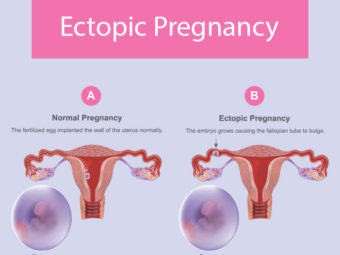
Image: ShutterStock
Silent reflux in babies is a common disorder that usually gets corrected as the baby grows older. The condition is also called laryngopharyngeal reflux or silent acid reflux. It occurs when the stomach acid flows reversely into the larynx and nasal passages. Some may consider it an extension of gastroesophageal reflux disease (GERD), a condition in which the stomach acid refluxes and irritates the esophagus.
The condition is termed “silent reflux” due to not having conspicuous signs and symptoms. The regurgitated stomach contents gradually return to the stomach. Read this post where we give you the causes, signs, and treatment options available for silent reflux in babies.
Causes Of Silent Reflux In Babies
Studies estimate that one in five children experiences a reflux disease. It is normal for babies under one year of age to have acid reflux, but if it persists beyond one year or is severe, then consult a pediatrician.
Here are some factors that lead to silent reflux in babies (1) (2).
- Newborns have underdeveloped esophageal sphincters – muscles at the end of the esophagus, that help in the passage of food from the food pipe into the stomach. Underdeveloped esophageal sphincters let the contents of the stomach flow backward into the esophagus, causing reflux.
- Food allergies and conditions, such as cow’s milk protein allergy, could trigger silent reflux.
- Neurological problems may cause feeding issues and silent reflux in some babies, especially those withcerebral palsyiX A set of muscular disorders affecting a person's ability to move, balance, and maintain proper postures .
- Defects in the larynx, such as laryngomalacia, increase the possibility of silent reflux in babies.
- Experts recommended babies to be slept on their backs to prevent interruption of the airways and sudden infant death syndrome (SIDS). However, sleeping on the back right after feeding might cause the stomach contents to regurgitateiX Movement of partially digested food and stomach contents back through the food pipe and to the mouth .
Image: Shutterstock
- Infants might have silent reflux as long as they have an exclusive liquid diet, as liquids are more likely to move backward than solids.
 Quick fact
Quick factThe signs of silent reflux are often not outright noticeable. However, careful observation could help parents determine if the baby has the condition.
Signs and Symptoms Of Silent Reflux In Babies
Babies with silent reflux may appear cheerful and only display discomfort before or after feeding. Silent reflux does not show intense signs like GERD, but it still causes discomfort. Here are some of the subtle signs that you may notice.
- Breathing with a wheezing or vibrating noise
- Pause in breathing while sleeping (apnea)
- Feeding difficulties (babies might arch their backs and retract from the nipple)
- Persistent cough
- Gagging and spitting up
Image: Shutterstock
- Recurring ear infections (your baby might be pulling or holding the ears)
- Crying and fussiness after feeding
If the silent reflux is severe or progressed into GERD, then the baby could feed inadequately, which may lead to poor growth in the long run. The signs of silent reflux may also indicate GERD. Therefore, see a doctor to determine the exact cause.
How Is Silent Acid Reflux In Babies Diagnosed?
Your pediatrician may perform a physical examination and ask you about the symptoms. So write down all the signs you observed or take a video when the baby presents the symptoms. The doctor may also check the height and weight of the baby to determine if they are feeding adequately.
Elaborate diagnostic procedures, such as barium tests or endoscopyiXA diagnostic method where a thin tube (with a camera) is inserted down the throat to check for underlying digestive disorders , are usually performed when there is no improvement in the baby’s condition after observing treatment procedures or the baby is not gaining weight.
Treatment For Silent Reflux
In most babies, silent reflux gradually resolves as the baby grows, and the esophageal sphincter matures. Until then, your doctor might recommend managing the reflux with a few measures similar to those taken in the case of gastroesophageal reflux disease.
According to the American Academy of Pediatrics, lifestyle changes are the first line of treatment for reflux in infants (3). You may take the following measures (4) (5).
- After each feed, burp the baby and keep them in an upright position for 30 minutes.
- If the baby is on a formula diet, then switch formulas after consulting a pediatrician. If the baby has cow’s milk protein allergy (CMPA), then the doctor may recommend specialized formulas, such as hydrolyzed formula.
- Maternal diet may be modified in cases of silent reflux in breastfed infants. Avoid spicy foods, caffeine, acidic foods, and dairy products, and observe if there are changes in the baby’s condition.
- Follow the baby’s hunger cues and feed as per demand. If possible, feed smaller portions more frequently with feeding spaced two to three hours apart, but only if the baby is comfortable with it.
Image: Shutterstock
- If the baby is bottle-fed, check if the nipple size is appropriate for the baby’s age. Incorrect nipple size can cause overfeeding or swallowing of excess air, which may exacerbate reflux.
- Try alternative bottle feeding techniques, such as paced bottle feeding, which prevent overfeeding, and, thus, may relieve silent reflux.
- If your baby is older than six months, then try feeding thick purees or cereals to minimize regurgitation and reflux.
Medications, such as H2 blockers and proton pump inhibitors (PPI), are usually not needed unless silent reflux has progressed to gastroesophageal reflux disease (GERD). Innate defects of the larynx that cause silent reflux may require surgical treatment. Surgical interventions for reflux, such as fundoplicationiXA surgical procedure that helps treat severe acid reflux in infants , are usually reserved for GERD.
Simple Home Remedies For Silent Acid Reflux In Babies
Parents can consider some simple home remedies for silent reflux. However, most of these natural remedies lack scientific backing, so consult your pediatrician before trying them.
1. Massage
Image: Shutterstock
Anecdotal evidence suggests that basic massaging techniques, such as bicycling the legs or massaging the baby’s tummy gently in a clockwise direction, might help relieve gas and bloating in babies, thus reducing discomfort and fussiness.
2. Elevate the sleeping position
Elevating the baby’s sleeping position might help babies with acid reflux. Some parents use a baby lounger to achieve this position and while traveling. There is no scientific proof for the effectiveness of this method. So, try it only if you and your baby are comfortable.
3. Cumin seed water
Studies suggest that cumin seeds aid in digestion and help relieve bloating and colic, so it might help reduce the symptoms of silent acid reflux in babies. Boil one teaspoon of cumin seeds in water, strain it, and give two spoonfuls to your baby every day (6). This measure should be tried only in babies above six months of age.
4. Infant prebiotics
If your pediatrician recommends, you may consider using infant prebiotics to promote good gut health for your baby. These are available as a powder, which can be mixed with breastmilk and given to the baby.
Consult a pediatrician before trying any edible home remedy. If a home remedy does not work, try later but do not force it on the baby.
 Quick tip
Quick tipWhat Are The Complications Of Silent Reflux In Babies?
Long-term silent reflux may increase the risk of the following complications.
- Recurrent pneumonia
- Chronic laryngitisiXInflammation of the voice box, often caused due to strain or infection, resulting in horse voice or breathing difficulties
- Persistent cough
- Oral cavity problems (1)
Image: Shutterstock
Chronic silent reflux could progress to gastroesophageal reflux (GER), which eventually leads to gastroesophageal reflux disease (GERD).
Frequently Asked Questions
1. Are hiccups a sign of silent reflux in babies?
Hiccups are a common phenomenon when your baby takes in more air while feeding, and it alone may not indicate silent acid reflux. If your baby has hiccups along with cough and spit up, then it could be a sign of silent acid reflux.
2. Does Gripe Water help address silent acid reflux?
Anecdotal evidence suggests that Gripe Water might reduce stomach acid, thus relieving symptoms of silent acid reflux. But, there is no scientific backing for this claim. Consult your doctor before giving Gripe Water to your baby.
3. How can I help my baby with acid reflux sleep peacefully?
Acid reflux might disturb your baby’s sleep as they frequently wake up in the middle of the night. To help your baby sleep better, observe the various lifestyle changes steps that can relieve silent acid reflux and help the baby sleep better.
4. Does tummy time help with reflux?
Tummy time may not reduce reflux episodes in babies to make them feel better. Holding them in an upright position can help (7).
5. Does a dummy help with reflux in babies?
A dummy (pacifier) for non-nutritive sucking may help with stomach emptying and decrease the number of reflux episodes in babies (8).
6. How long does it take for infant Gaviscon to work for silent reflux?
Infant Gavison is indicated for reflux and may take about 30 minutes to work. It works by forming a layer over the surface of your child’s stomach contents and prevents the stomach contents from coming back to the food pipe (9).
Silent reflux in babies may be tough to diagnose since it may not have any evident signs and might resolve without adverse effects. However, it could cause discomfort in babies after a feed and lead to other conditions such as cough and breathing and feeding troubles. Therefore, if your baby has frequent episodes of silent reflux accompanied by any of these signs, get them evaluated by a healthcare professional. Prompt medical attention is necessary since silent acid reflux may progress to more severe conditions, such as GERD, if left untreated.
Key Pointers
- Silent reflux or silent acid reflux in babies happens due to underdeveloped esophageal sphincters, allergies, neurological issues, and defects in the larynx.
- You may notice wheezing, feeding difficulties, persistent cough, and ear infections due to silent reflux.
- The condition resolves on its own without treatment in most babies.
- Burping the baby after a feed, modifying maternal diet, and switching formulas after doctor consultation may help manage this condition.
References:
2. Reflux in Infants; U.S. National Library of Medicine
3. Gastroesophageal Reflux &Gastroesophageal Reflux Disease: Parent FAQs; American Academy of Pediatrics
4. Gastroesophageal Reflux: Helping Your Baby Seattle Children’s
5. AAP Releases Guideline for the Management of Gastroesophageal Reflux in Children; American Academy of Pediatrics
6. R. K. Johri; Cuminumcyminum and Carumcarvi: An update; NCBI
7. Reflux (GOR) and GORD; THe Royal Children’s Hospital, Melbourne
8. Dummy (pacifier) use; Reflux Infants Support Association Inc, Australia
9. Gaviscon for gastro-oesophageal reflux disease; Medicines for Children, UK




















